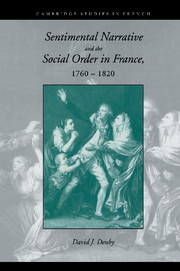Book contents
- Frontmatter
- Contents
- Acknowledgements
- Note on spelling
- Introduction: the politics of tears
- 1 Three sentimental writers
- 2 Towards a model of the sentimental text
- 3 Love and money: social hierarchy in the sentimental text
- 4 Sentimentalism in the rhetoric of the Revolution
- 5 Sentimentalism and idéologie
- 6 Beyond sentimentalism? Madame de Staël
- Conclusions
- Notes
- Bibliography
- Index
- CAMBRIDGE STUDIES IN FRENCH
Conclusions
Published online by Cambridge University Press: 29 August 2009
- Frontmatter
- Contents
- Acknowledgements
- Note on spelling
- Introduction: the politics of tears
- 1 Three sentimental writers
- 2 Towards a model of the sentimental text
- 3 Love and money: social hierarchy in the sentimental text
- 4 Sentimentalism in the rhetoric of the Revolution
- 5 Sentimentalism and idéologie
- 6 Beyond sentimentalism? Madame de Staël
- Conclusions
- Notes
- Bibliography
- Index
- CAMBRIDGE STUDIES IN FRENCH
Summary
I have argued that sentimental narratives occupy a central place in the project of the French Enlightenment. Making such an argument requires a readiness to open up links – between categories, between genres and text types, between periods – which have sometimes been artificially separated. Between categories: reason and sentiment can no longer be posited as contradictory polarities in eighteenth-century cultural formations; rationality can be accessed experientially and affectively, just as the constitution of reason as a historical category uses textual procedures entirely consonant with sentimental narratives. Between genres and text types: one of my basic presuppositions throughout is that the formal, as opposed to the thematic analysis of texts is the best route to their historical significance. The links which I have shown between literary texts (both canonical and marginal) and other forms of discourse – political, social, economic and historical – rely on a principle of comparability which is essentially formal. Between periods: in my narrative, the French Revolution is neither a point of departure nor a point of arrival, but rather the central historical experience around which transformations in ideological and discursive formations are articulated.
- Type
- Chapter
- Information
- Sentimental Narrative and the Social Order in France, 1760–1820 , pp. 240 - 248Publisher: Cambridge University PressPrint publication year: 1994



